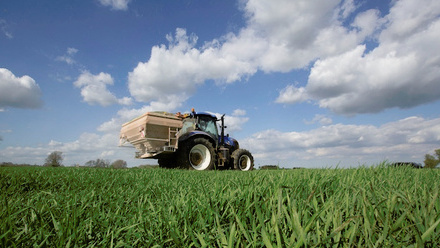FAQs: UK Forest Risk Commodity Regulation (UKFRC) and EU Deforestation Regulation (EUDR)

Find the answers to frequently asked questions on businesses being required to comply with forthcoming deforestation, or "due diligence", regulations in the UK and EU.
The UK Government is bringing forward its Forest Risk Commodity Regulation (UKFRC), while the EU Deforestation Regulation (EUDR) has already been introduced.
Both sets of regulations seek to minimise deforestation or forest degradation worldwide.
Full details of, and accompanying guidance documents for UKFRC are not yet available. This resource carries links to currently available documents relating to EUDR.
The Agricultural Industries Confederation (AIC) - the UK trade association for agricultural supply businesses including animal feed manufacturers and crop commodity merchants - has collated the following commonly asked questions and answers to help provide some clarity and guidance on the issues that its Members and other industry stakeholders are raising.
This resource will be routinely updated as more information becomes available.
For further information on both sets of regulations, AIC Members can view a webinar held in February 2024 by clicking below.
UK Forest Risk Commodity Regulation (UKFRC)
What is the UKFRC and why is it needed?
In 2021, the Department for Environment, Food and Rural Affairs (Defra) announced that provisions under the Environment Act would introduce a due diligence requirement on certain forest risk commodities.
This would prohibit larger companies from using agricultural commodities that have not been produced in line with local laws in the countries where they originate. This followed two government consultations in both 2020 and 2021.
After a pause in implementing the legislation, Defra had signalled its intent to do this before the last General Election but the legislation was not laid prior to the dissolution of Parliament.
What products will be in scope?
Defra has confirmed that the following products will be in scope:
- Non-dairy cattle products (beef and leather)
- Cocoa
- Palm
- Soya
Dairy products will be separately in scope where they are derived from animals fed on a diet that contains a forest risk commodity, such as soya or palm kernal expeller.
Are products derivatives, by-products and co-products of these commodities in scope?
Raw or primary forest risk commodities and all products derived from these commodities will be regulated. This includes products that may currently be considered as "waste products" or "by-products":
- Soy hulls
- Palm Kernel Expeller
- Hides from a bovine animal
Which businesses will be in scope of UKFRC regulation?
Organisations using these commodities in UK supply chains with a global turnover of over £50 million are in scope of the UKFRC regulation.
Organisations whose use of the regulated commodities does not exceed the annual volume threshold of 500 tonnes may submit an exemption.
How is AIC working with the authorities to ensure that the concerns of its Members are being addressed?
AIC has had regular contact with the Defra teams which are working on this UKFRC regulation.
Engagement to date has included AIC participating in workshops and feeding in to consultation exercises, as well as holding constructive one-to-one meetings with policymakers.
Defra has indicated that there will be the need for continued engagement with industry representatives to help with drafting the guidance which will accompany the legislation.
When will the secondary legislation for UKFRC be laid?
The laying date was expected to be by the end of May 2024. Given that the draft secondary legislation had not successfully passed through Parliament prior to the announcement of a General Election, it is not possible to say when the legislation will progress.
Is the legislation regarded as a priority by the current Government?
AIC contact with the current Labour Government has confirmed that the legislation is still regarded as a priority. However, the Government has given little indication as to when they might find the necessary Parliamentary time to pass the legislation into law.
Has AIC or the industry had any communication with the current Government on UKFRC?
In March 2025, Defra and ICF launched a survey to enhance their understanding of supply chain management for commodities such as soy, palm, rubber, timber, leather, beef, cocoa and coffee.
AIC understand that a new Defra team is now working on UKFRC and the survey is intended as an information gathering exercise. AIC have contacted the new Defra team to seek an initial meeting.
After the secondary legislation is laid, how long will it take for the regulation to come into force - and will there be a transition period?
Passing the secondary legislation through both Houses of Parliament would take at least 4 months.
Defra had indicated that they would consider a ‘grace’ period of at least six months prior to the full implementation of the legislation.
Given this, AIC considers it unlikely that the legislation would come into force prior to the end of 2025.
Will Defra provide guidance on how businesses can demonstrate compliance with UKFRC?
Defra has committed to providing comprehensive guidance on the type and scope of evidence that businesses in scope will be expected to provide in its annual compliance reports.
It is not yet clear whether this guidance will be published at the same time that the secondary legislation is laid.
Will UKFRC effectively mean a ban on certain imports?
The UKFRC regulation is not a ban on importing forest risk commodities in scope.
It will require businesses in scope to submit an annual compliance report that products in scope - soya, palm and their derivatives (e.g. co-products) - have been produced in accordance with local laws.
Given this, AIC does not see any immediate impact on availability of certain commodities as a result of the implementation of UKFRC.
Which competent authority has been appointed to implement UKFRC?
AIC understands that a competent authority had been appointed by Defra to implement the regulation prior to the last General Election.
AIC has received no confirmation, from either the previous or current Governments, of which agency this is.
Does the scope of UKFRC include co-products and derivatives of the commodities listed?
Given that the UKFRC brings embedded commodities into scope, how will food companies demonstrate compliance?
Will businesses in Northern Ireland need to comply with UKFRC, EUDR or both?
As drafted, businesses based in Northern Ireland will have to comply with both UK and EU legislation.
AIC is aware that the UK Government and the EU Commission are still discussing the details of implementation.
Might the UK Government consider aligning UKFRC with EUDR?
What are the key differences in the scope of UKFRC and EUDR?
The table below succinctly sets out the key differences in scope between UKFRC and EUDR.
|
|
Illegal deforestation |
Legal deforestation |
Illegal conversion |
Legal conversion |
Direct |
Embedded |
Assurance mechanism |
Cut-off date |
Geo-location data |
Entry into force |
|---|---|---|---|---|---|---|---|---|---|---|
EUDR |
X | X | X | X | X | X | X | 2025 | ||
UKFRC |
X | X | X | X | X | TBC |
What steps do agri-supply businesses need to take to comply with the UKFRC?
Agri-supply businesses in scope will be required perform due diligence to make a judgement on forest-risk commodity sourcing and the integrity of their supply chain.
They will need to map their supply chain and assess the risk of illegality, creating a risk management plan. This plan will need to be actioned in order to mitigate identified risks to a level as low as reasonably practicable.
Businesses will need to submit an annual report on this due diligence activity. Defra have stated that information that must be included will be detailed in published guidance.
Is AIC working on an assurance scheme or standard in this area to support the industry?
AIC is planning to develop a voluntary, UKFRC aligned standard under the AIC Sustainable Commodities Scheme requiring Participants to demonstrate to auditors that the commodities they "use" have been produced on land that is legally occupied or used.
The standard could be used for a range of in-scope commodities, such as soyabean meal, palm oil and derived products.
The standard would be of value to AIC Members to help them demonstrate compliance with UK FRC regulation. It will also be of value to downstream supply chain partners as it will provide transparency on which businesses are deemed to be aligned with the requirements of the UKFRC regulation.
EU Deforestation Regulation (EUDR)
The EUDR information hub is available on the FEFAC website.
What is the EUDR and why is it needed?
Under the EU Deforestation Regulation (EUDR), any operator or trader who places commodities - such as soya, beef, palm oil, wood, cocoa, coffee, rubber - on the EU market, or exports from it, must be able to prove that the products do not originate from recently deforested land or have contributed to forest degradation.
Relevant goods must also be covered by a due diligence statement and be produced in accordance with applicable local laws.
When was the EUDR introduced?
EUDR was introduced in June 2023. As of 30 December 2024, the key articles of the EUDR will apply, leaving a short adaptation and preparation period.
However, on 2 October 2024 the European Commission announced proposals to delay the implementation of EUDR by 12 months and this was confirmed on 18 December 2024.
The regulation (2023/1115) can be found on the European Commission website.
Is the proposed one year postponement of EUDR now official?
Yes, the formal adoption of the European Commission proposal to delay the implementation of EUDR by 12 months was confirmed on 18 December 2024. All relevant documents are available on the European Council website.
On 2 October the European Commission announced proposals to delay the implementation of EUDR by 12 months.
The proposal moves the date of implementation to 30 December 2025 for large companies, and 30 June 2026 for small companies.
What is the latest EUDR guidance from the EU Commission following the delay of implementation?
On 2 October, the EU Commission published additional guidance documents. Click below for the latest information:
Has the EU Commission published any further guidance documents since 2nd October 2024?
On 4 March 2025 the European Commission published a document with a 10 scenario overview of how the EUDR requirements would apply depending on the company type (operator/trader) and company size and position in the supply chain.
This non-legally binding publication, "Understanding your company position in the supply chain under the EUDR" should be read alongside the EUDR FAQ and Guidance document. The scenarios cover the relevant products in scope of the regulation as listed in Annex I.
Given it is not listed in the Annex I, is compound feed in scope of the regulation?
In one of the scenarios set out in the document published on 4th March 2025, the description of the sale of soybean meal by oilseed crusher to a feed mill provides the first explicit reference that compound feed is not part of the EUDR scope.
“Oilseed crushing facility A sells the soymeal (HS 1208) to feed mill B, which blends the soymeal with other ingredients like grains and minerals to produce compound feeds (HS 2309) for livestock. As compound feed is not a relevant product under EUDR (Annex I), feed mill B does not have obligations under EUDR for this product (FAQ. 2.1).”
This reference is consistent with the viewpoint that compound feed lies outside the scope of the regulation delivered via a legal opinion sought by FEFAC on behalf of the European feed industry.
The legal opinion stated:
‘According to Article 2 No 2 of the EUDR, relevant products are only those which are listed in Annex I on the basis of the corresponding goods tariff number. Compound feed of HS heading 2309 is not mentioned in Annex I. The mere fact that relevant commodities, notably soya, are contained in a product is not sufficient for the application of the EUDR (see European Commission, FAQ as of October 2024, No. 2.1).’
How should we interpret the requirements of Recital 39?
Recital 39 states that ‘operators placing on the market or exporting relevant products that contain or have been made using cattle which have been fed with relevant products that contain or have been made using other relevant commodities or relevant products, should ensure, as part of their due diligence system, that the feed is deforestation-free’
The EU Commission document published on 4th March 2025 and the legal opinion delivered to FEFAC would suggest that compound feed lies outside the scope of the regulation, whether it contains ‘relevant products’ or not.
The Commission document still leaves room for some confusion as it refers to “soymeal feed” and “cattle feed” which do not have a clear legal status.
If cattle, supplying beef to the EU market, are fed straight soya or palm products listed in Annex I then it is clear that these fall within the scope of the regulation and evidence may need to be provided that these ’relevant products’ are deforestation free.
What is the legal definition of compound feed?
A compound feed is defined in legislation as ‘a mixture of at least two feed materials, whether or not containing feed additives, for oral animal-feeding in the form of complete or complementary feed’. Given this, livestock farmers buying straights and mixing them to prepare a ration (TMR etc) are preparing a compound feed.
Similarly, a blend is compound feed assuming it meets the definition above.
Has AIC held discussions with UK beef and dairy supply chain partners who may be engaged in the supply of in-scope beef products to the EU?
AIC has been in regular discussions with meat and dairy industry organisations, producer representatives and retailers. We will point our members to any published guidance as and when this becomes available.
What steps do agri-supply businesses need to take to comply with the EUDR?
Prior to placing relevant commodities on the EU market, agri-supply businesses must carry out mandatory due diligence to ensure these products are deforestation-free and legally produced (based on a cut-off date of 31 December 2020).
Critically, companies must provide geo-location co-ordinates for commodities providing traceability and evidence that they have not been produced on recently deforested land.
Has the EU Commission provided any information or guidance to businesses on use of the EUDR information system?
In March 2025, the EU Commission published a new training video concerning the EUDR Information System.
This video is longer than those previously published and can be found on the dedicated webpage - https://green-business.ec.europa.eu/deforestation-regulation-implementation/information-system-deforestation-regulation_en#training-videos
How is AIC working with its European partners and authorities to ensure that Member concerns are being addressed?
AIC is an active member of the European feed industry federation FEFAC, and is engaged with a number of FEFAC group working on EUDR.
FEFAC has joined forces with the European association of trade in cereals, oilseeds, rice, pulses, olive oil, oils and fats, animal feed and agrisupply - COCERAL - and FEDIOL, the European vegetable oil and proteinmeal industry association, to represent the combined interests of the agri-supply sector with the various EU decision making bodies.
What are feed industry representative organisations doing to try and alleviate concerns about potential impacts on the soyabean meal market?
There is concern that the lack of clarity over EUDR is affecting the market for soyabean meal, particularly for contracts from 4th Quarter 2025 onwards, and it is true that for EUDR, many uncertainties remain.
European trade association FEFAC, of which AIC is a member, has written to David Clarinval, EU farm minister, expressing concern at the impact of EUDR uncertainty on feed security.
FEFAC calls on the EU Council to focus on delivery of a functional IT system as a matter of urgency and to consider phasing in traceability requirements over a period of time.
FEFAC also recommends making use of existing traceability tools, such as the FEFAC Soy Sourcing Guidelines, as part of this transition.
Visit the FEFAC website for more detail.
Are there any other initiatives underway in the EU which might affect the implementation of EUDR?
In February 2025, FEFAC, COCERAL and FEDIOL called for EUDR to be included in the scope of the EU Omnibus Simplification package. The call included specific recommendations which were:
- Removal of alleged obligation for cattle farmers that their feed is deforestation-free, as part of their due diligence requirements (Recital 39)
- Limit the obligations for complying with Article 3 to first-placers on the EU market of relevant products (Article 5)
What action does AIC recommend feed compounding Member businesses take to manage these uncertainties?
There is no doubt that whilst EUDR will not be implemented in Great Britain (it will apply in Northern Ireland), similar impacts to those seen in EU will be seen in UK.
AIC would recommend feed compounders remain in regular contact with their soya suppliers. AIC will provide further clarity on EUDR as soon as this becomes available.
Has the UK Government appointed a competent authority for the implementation of EUDR in Northern Ireland?
To date (March 2025), UK Government has not appointed a competent authority for the implementation of the regulation in Northern Ireland.
AIC understands that a competent authority will be appointed following the publication by the EU Commission of the country deforestation risk classification system (benchmarking system). This is expected to be complete by June or July 2025.
EU Commission has published a list of EUDR competent authorities
Is AIC working on an assurance scheme or standard in this area to support the industry?
AIC has developed a voluntary, EUDR aligned standard under the AIC Sustainable Commodities Scheme (ASCS). The EUDR Aligned Module sets out to demonstrate that Participants handling products within the scope of EUDR have systems in place which are aligned with the requirements of EUDR.
The EUDR Aligned Module cannot confirm that Participants are compliant with the requirements of EUDR, as compliance can only be assessed by the appointed competent authorities. However, being a certified Participant will help meet the regulatory requirements, as appropriate documented procedures and processes will be in place. The definitions used in the module for forest and deforestation are common to those set out in the Regulation. The module requires that no legal or illegal deforestation has taken place since 31st December 2020.
AIC consulted on the draft standard in December 2024 and produced a consultation pack. Following consultation responses the draft standard is under review.
How will the AIC EUDR Aligned Module support members and their supply chain partners?
Some supply chain partners have confirmed the requirement to demonstrate that commodities in scope of EUDR and used in feed, are compliant with the requirements of the Regulation.
This is to help ensure the maintenance of market access to the EU for other in-scope commodities such as UK beef supplied from beef and dairy producers.
Other supply chain partners, including the UK Soya Manifesto signatories, have indicated their intention to require their livestock farming suppliers to use ‘EUDR compliant’ soya in feed as a stepping stone towards the Manifesto commitment of using verified deforestation and conversion free soya in their supply chains by the end of 2025.
AIC’s EUDR Aligned Module will be used by these supply chain partners as evidence to verify that the in-scope commodities in feed, supplied by certified Participants in the ASCS, are considered aligned with EUDR requirements.




